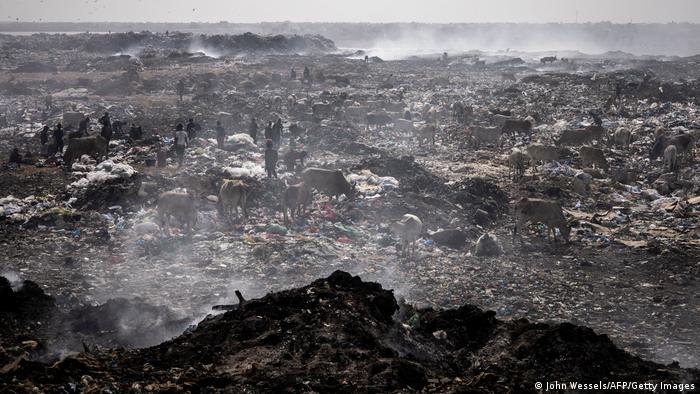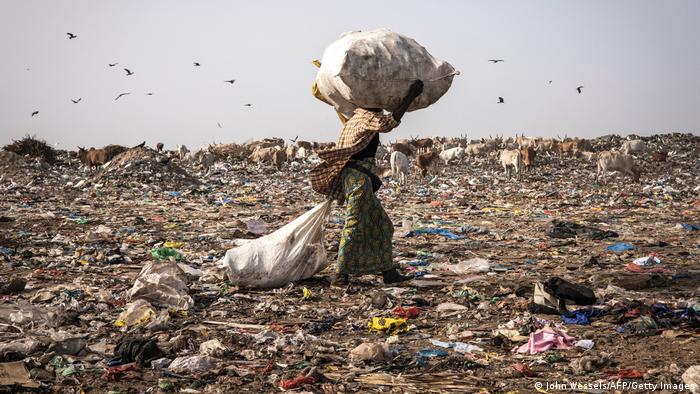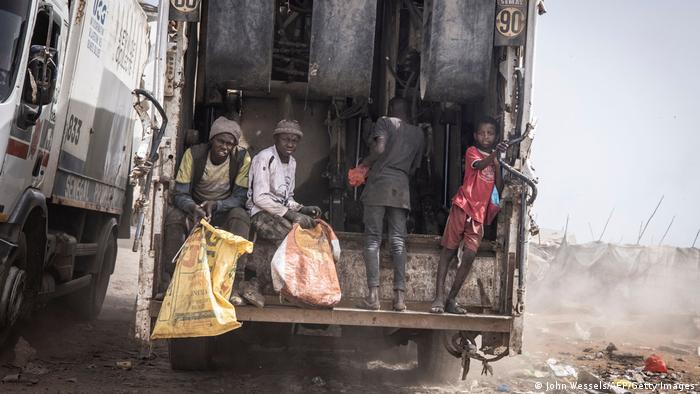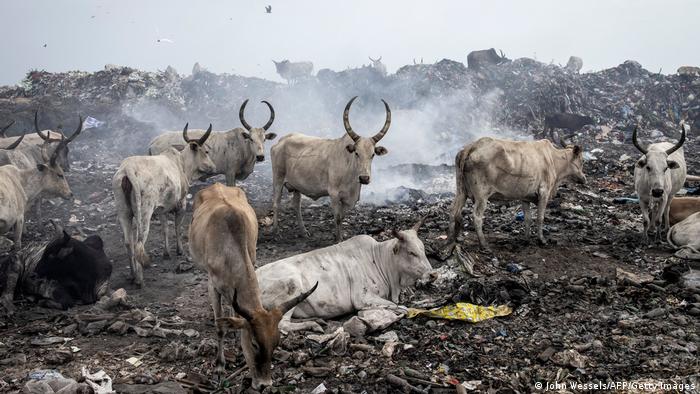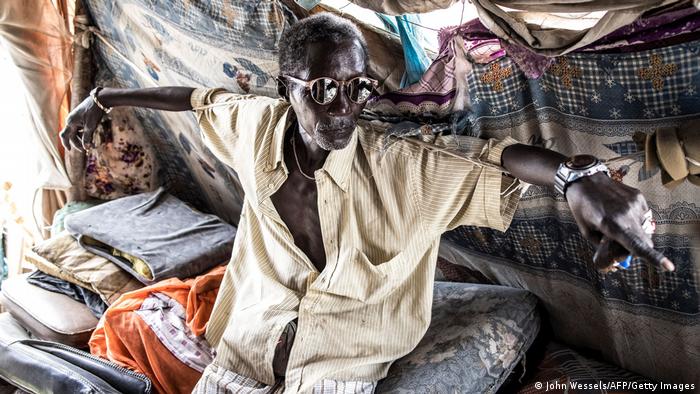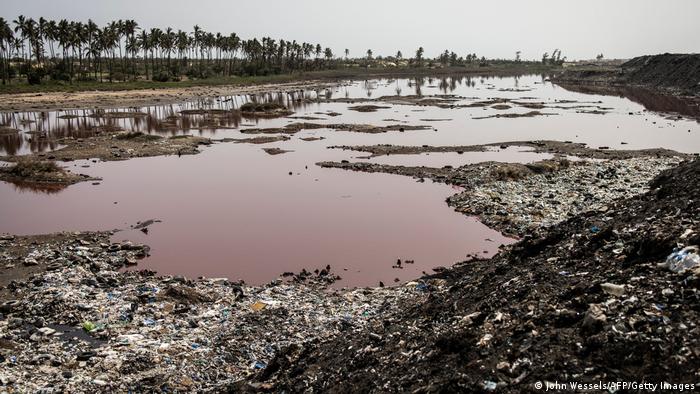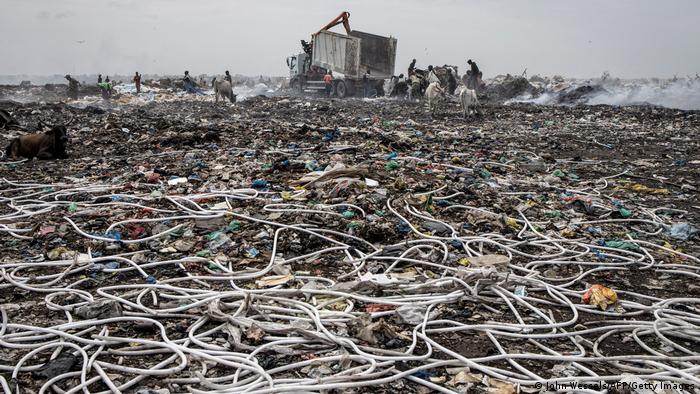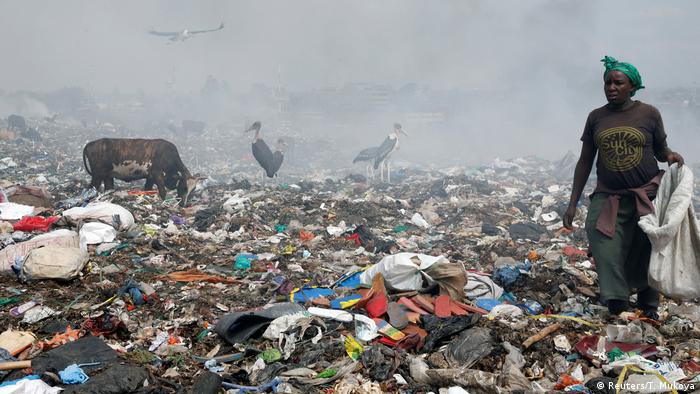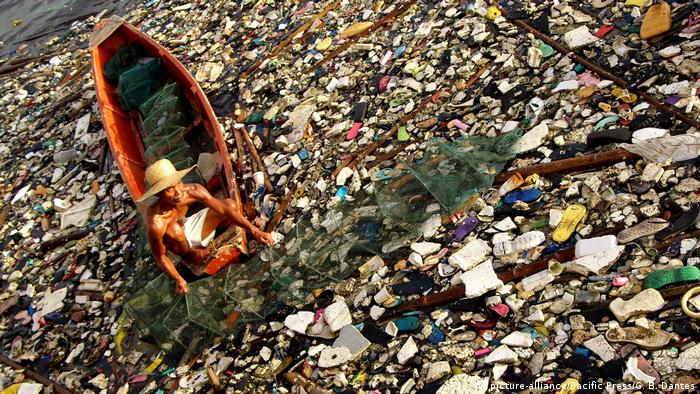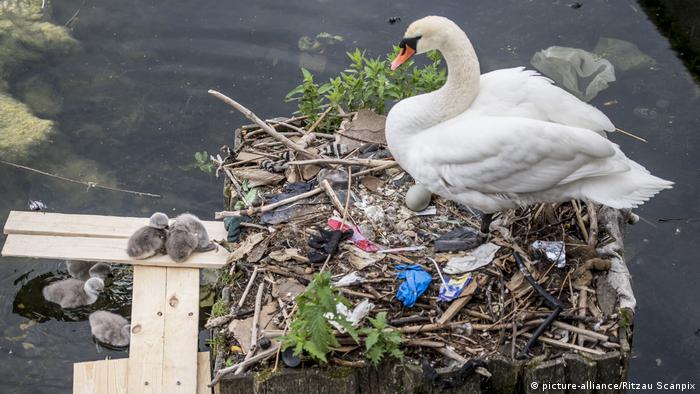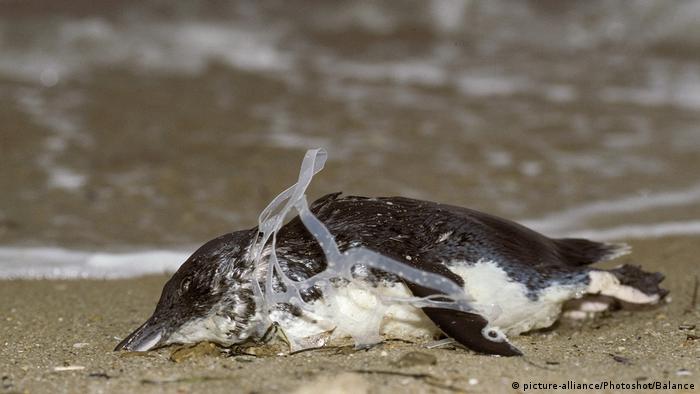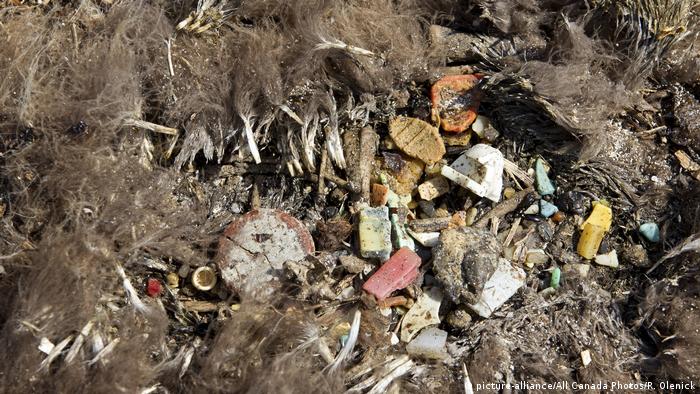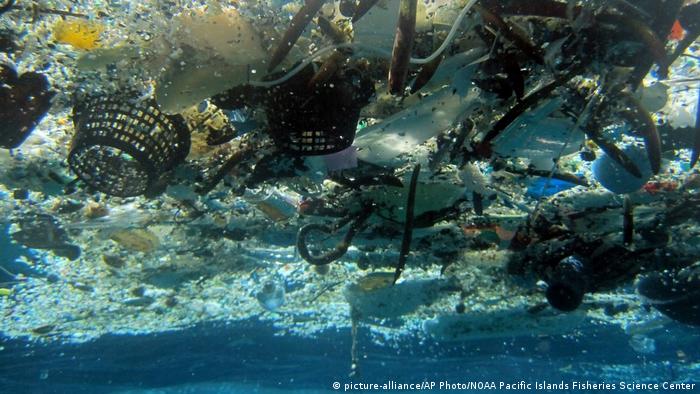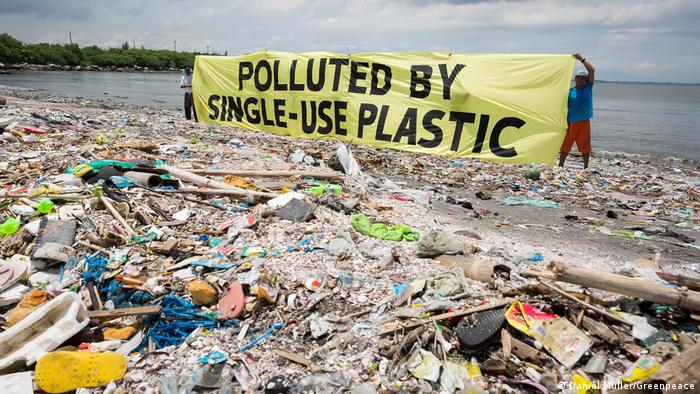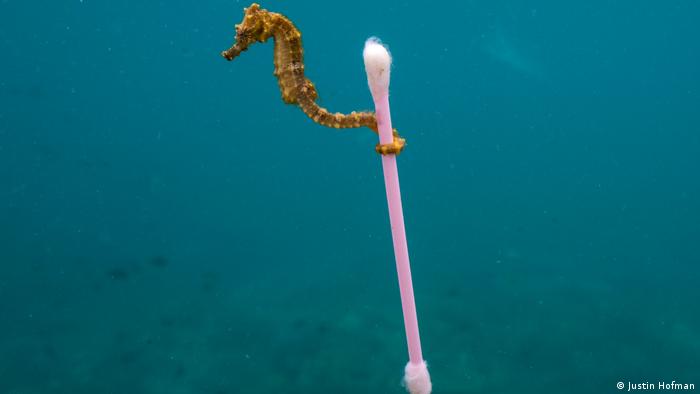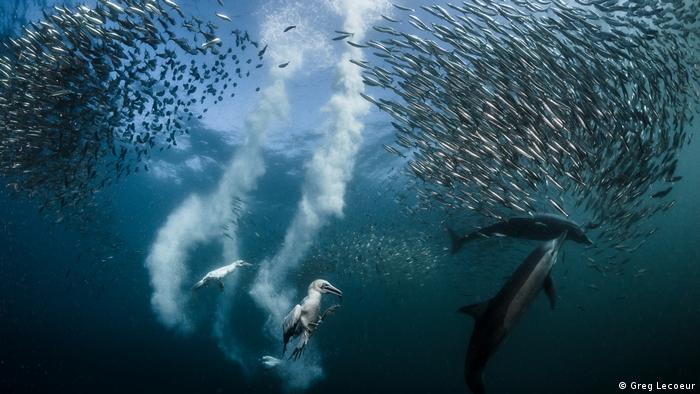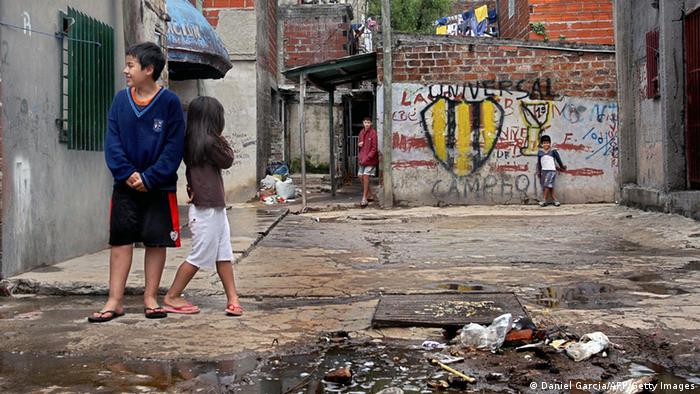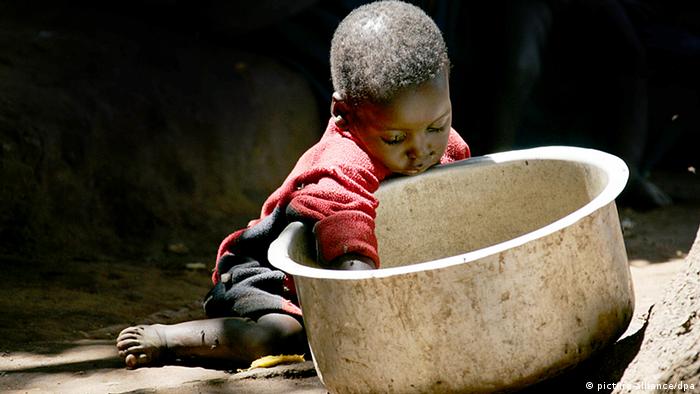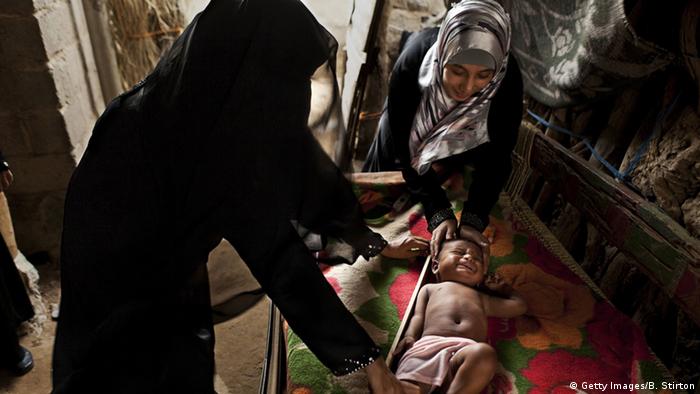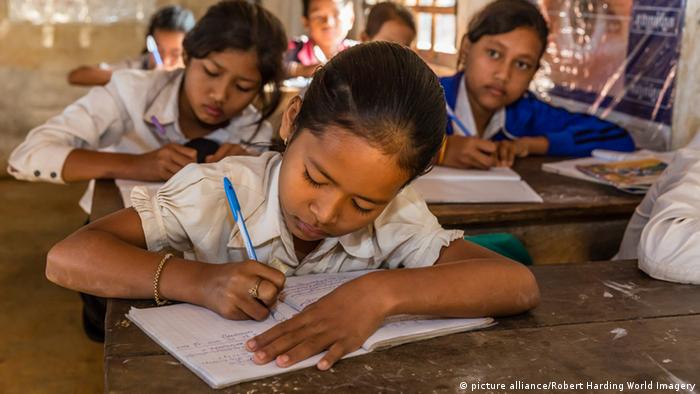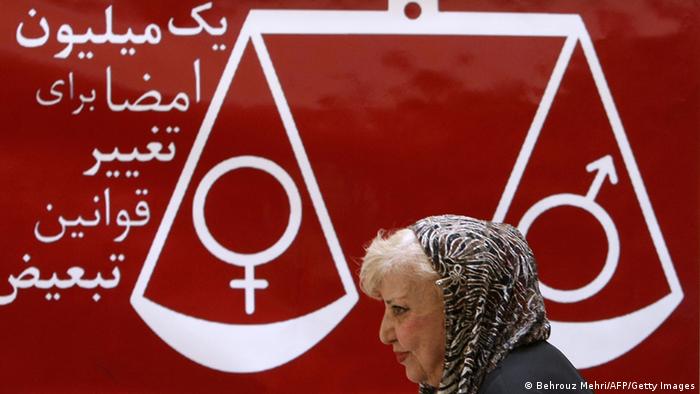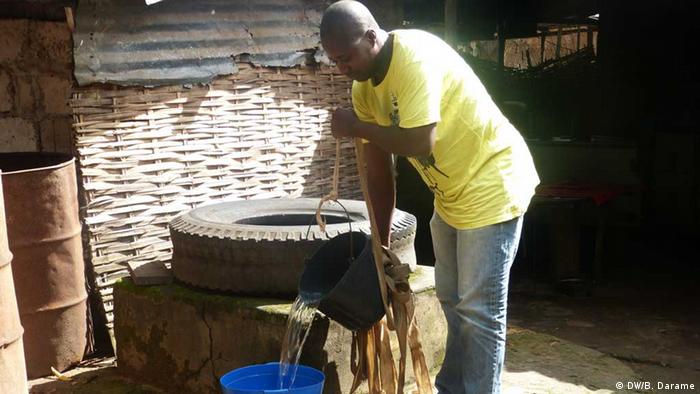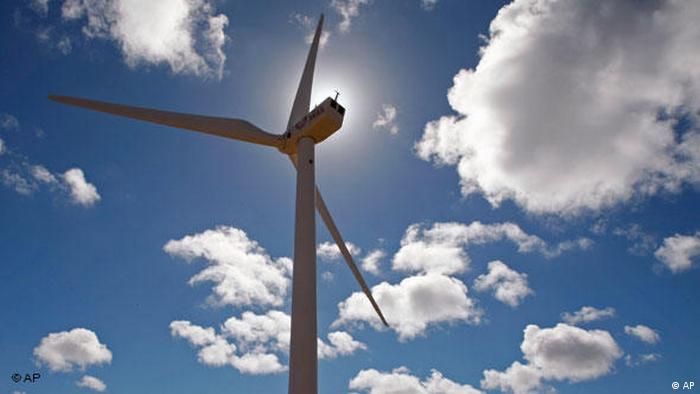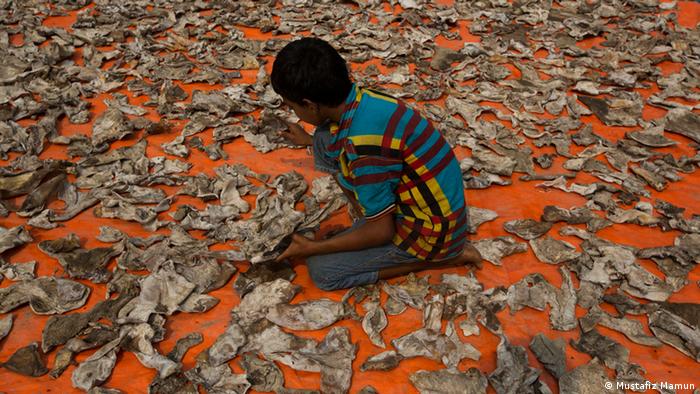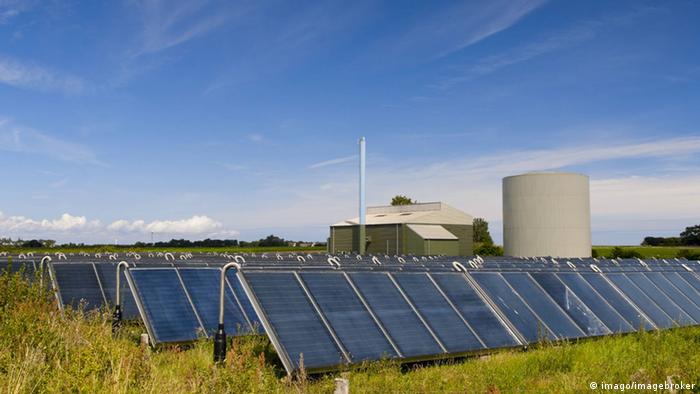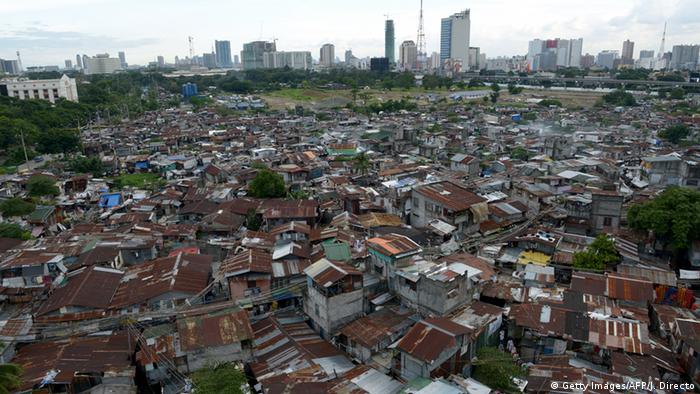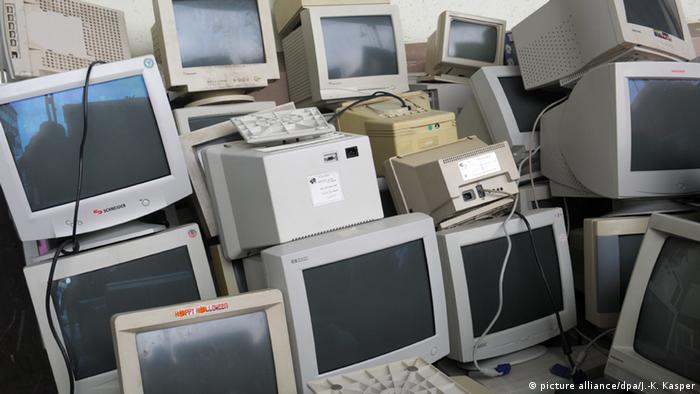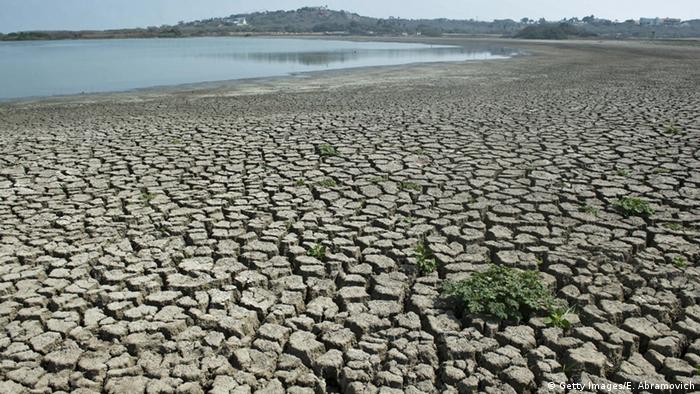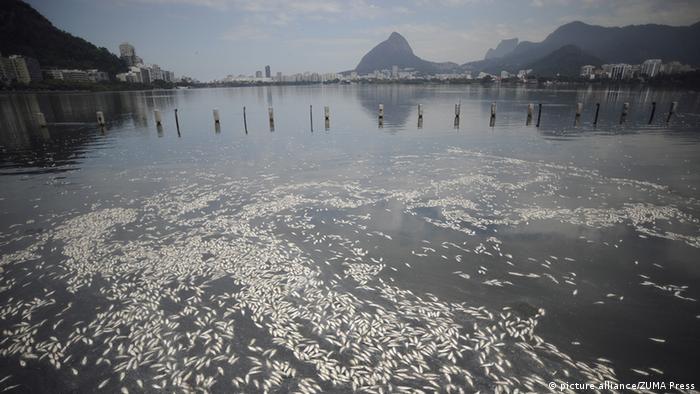David Kumordzi, a composer and musician, is based in Accra, Ghana’s capital. He spends a lot of his time mobilizing people to clean up his country’s beaches.
The waste Kumordzi and his team collect include plastics and waste clothing.
“Most of Europe’s wastes are coming from Europe, because we are connected to Atlantic Ocean. Most of the wastes we are seeing around our beaches are not from Ghana,” he told DW from Accra.
He blamed Europe and the tons of waste that were washed ashore every day.
“Ninety percent of the wastes are from the Atlantic Ocean,” according to Kumordzi, who said the West is to blame for the tons of traash found in the ocean.
Since years, environmental activists in Africa have raised concerns about the rapid growth of Africa as a European dumpsite.
-
Dakar waste pickers
On the hunt to find plastic and metals
Around 2,000 waste pickers work in the Mbeubeuss landfill, outside Dakar, the Senegalese capital. They either search for recyclable plastic with an iron hook or burn the trash to recover valuable metals.
-
Dakar waste pickers
Wholesalers purchase recyclables
The workers make their living by selling recyclable material wholesalers. According to NGO Wiego, some pickers can earn more than 100,000 West African CFA Francs (about 150/$180 per month). This is a very high income in Senegal. Many pickers make much less than that.
-
Dakar waste pickers
Stench of new rubbish
Pickers must endure extreme heat and the stench from the landfill to make a living. They wait for trucks to dump trash on the huge pile of garbage at the site every day. They then pick as fast as they can.
-
Dakar waste pickers
Cattle roam the dumpsite
Each day, approximately 230 trucks transport 1,300 tons of trash to the landfill site. The trash attracts birds and cattle, which wander the 114-hectare (280-acre) site to find food.
-
Dakar waste pickers
Pickers are “always the losers”
Pape Nyiaye, spokesperson for the waste pickers group, said that it is becoming increasingly difficult to make a living in Mbeubeuss. There is also the problem that the wholesale prices of waste are stagnating, which makes it more difficult to compete. He said that pickers provide an environmental service by recycling, but they are “always the losers”, according to news agency Agence France-Presse.
-
Dakar waste pickers
An environmental hazard
Mbeubeuss has been identified as a major environment hazard. The toxic smoke from the burning of the waste can be seen in the dump and can reach nearby residential areas. The pollution has made a lake near the landfill turn red.
-
Dakar waste pickers
Dump’s days may be over
After decades of neglecting Mbeubeuss, the Senegalese government decided to close the open air landfill. It will be transformed into a waste separation facility in 2025. It will be the end of the picking season for the pickers.
Author: John Wessels, Beatrice Christofaro (Text), John Wessels
More rags than riches
A constant stream of containers containing disregarded items, ranging from electronic waste to clothing, arrives on the continent. It’s not only a nuisance but also a threat to the environment and human health.
West Africa’s hub for used clothing from the West is found in Accra’s Kantamanto Market.
Traders sort through piles of imported clothes to find high-quality items. But there are usually more rags than riches.
Every week, about 15 million individual items of used clothing arrive in Ghana, according to the OR Foundation, a human rights and environmental NGO from the United States.
Old clothes from Europe
Forty percent of these items end up discarded due to their poor quality. They find their way to landfills from where they are often washed into the ocean.
Liz Richetts is the co-founder and chief executive of the OR Foundation. She told DW that some clothes are simply trash from European households.
“Sixty percent of the clothing that comes into our stores is made from recycled materials.” [into Africa]are already trash and that number actually has gone up from what was previously known. This could be a shirts that somebody painted their homes and then they wiped their hands all over it, and they end here [Ghana]Richetts lamented.
She stated that some of the items had been deliberately destroyed and should not have ended up in Africa.
-
The ugly side of plastic pollution
Plastic is the new age
Plastic is light, durable and extremely popular. Since 1950, mass production of plastic began. We have produced 8.3 million metric tons. It doesn’t biodegrade easily so much of the material we produce now ends up in landfills around Nairobi. There are many rubbish pickers that search for recyclable plastics in order to make a living. But plastic also ends up in oceans.
-
The ugly side of plastic pollution
Rivers of Plastic
Plastics are found in marine habitats through rivers such as the Yangtze River, the Indus River, the Ganges and the Pearl River. These rivers are found in densely populated areas where there is not enough waste disposal infrastructure. Here, a fisherman from the Philippines removes a crab and fish trap from plastic-filled water.
-
The ugly side of plastic pollution
A plastic greeting to the world
Plastic waste is used by some animals. This swan was found nestled in garbage at a Copenhagen lake, which is very popular with tourists. Her cygnets were born surrounded by garbage. It’s not the best place to start your day. Some animals are more affected than others.
-
The ugly side of plastic pollution
Deathly consequences
Plastic is durable and can be used to make long-lasting products like furniture and pipes. However, around half of plastic goes to disposable products such as single-use cutlery or six pack rings that end in the natural environment. This penguin is at risk of becoming entangled and even dying.
-
The ugly side of plastic pollution
Plastic eating
Other animals mistakenly mistake the material as food. The albatross chick, which was a juvenile albatross, was found dead on Sand Island in Hawaii. It had multiple pieces of plastic in her stomach. One study of 34 seabird species from Russia, Scandinavia, Greenland, Iceland, Svalbard and the Faroe Islands found that 74% had ingested plastic. The material can cause damage to the organs and blockages in your gut.
-
The ugly side of plastic pollution
Whale killer
Even larger animals are not immune to the harmful effects of plastic. This whale was found struggling with breathing and swimming in a Thai canal. The animal died after five plastic bags were thrown at it by rescuers trying to save it. The marine creature was unable to digest nutritious food because 80 shopping bags and other plastic waste were found in its stomach during the necropsy.
-
The ugly side of plastic pollution
Visible and invisible plastic
We are all familiar with the large amounts of plastic floating on the ocean’s surface. This is shown here off the Hawaiian coast. But did you also know that there are trillions of tiny particles with diameters less than 5 micrometers floating around in the ocean? These particles end up in our food chain. These particles are eaten by sea plankton, a key source of food for fishes and other marine animals.
-
The ugly side of plastic pollution
A finality in sight?
Some African countries have already taken tentative measures to reduce disposable plastic. They have also banned plastic bags. The European Union is considering banning single-use plastic products. Scientists believe that 12 billion metric tonnes of plastic will be on the planet by 2050 if current trends are maintained.
Author: Jennifer Collins
Electronic waste
Many African countries such as Nigeria, Zimbabwe, Ghana, Republic of Benin, amongst others receive huge containers filled with used electronic gadgets such as phones, kitchen appliances and even automobiles that are not road worthy on European roads.
These cars are often left in disrepair and have been in horrendous motor accidents in Europe.
These items were rejected in Europe for being unusable, but they make their way to Africa believing that they will be of use to the African people.
According to a UN report, the world produced over 53 million tons of electronic waste in 2019 alone up by 21% in just five years.
The UN’s Global E-waste Monitor 2020 has also predicted that global e-waste discarded products with a battery or plug will reach 74 metric tons by 2030, almost a doubling of e-waste in just 16 years.
This worrying trend makes electronic waste the world’s fastest growing domestic waste stream. It is driven primarily by high consumption rates of electronic and electrical equipment, short life cycles and few repair options.
Burdened in toxic e-waste
E-waste is toxic and can cause severe health problems.
Nnimmo Bassey is an African environmental expert and told DW Nigeria that “the trend in Africa is not only worrying, but consistent with what’s been going on for a while.”
Bassey said Africa is becoming a dumpsite for all kinds of waste because the rest of the world is rejecting it.
“Other nations are getting more conscious about wastes in their territories and they are rejecting toxic waste from polluting countries and suddenly Africa has become an attractive location,” he said.
Bassey believes that Africa lacks strong laws to regulate the import of wastes from West Africa into its territory.
“Our politicians, our governments are not taking a serious position on this phenomenon because they are also probably looking for payments for toxic wastes to be dump on the continent,” Bassey explained.
Attenuating climate change
The toxic waste pollution in Ghana’s Agbogbloshie Enclave is largely caused by electronic waste. Young Ghanaians risk their health to extract aluminium and copper among others items from the waste products.
Bassey stated that Africa is already suffering high levels of pollution due to the e-waste threat as it “experiences unprecedented effects of global warming and is adding to that by pollution from the extractive sector.”
The Sustainable Development Goals for the Environment are a way to get the world to work hard to reduce the effects of climate change.
Africa’s already feeling the effects of climate changes and many countries are becoming dumpsites for Europe, analysts worry that it won’t be able achieve its goals.
“You cannot have a clean environment when you are accepting waste to be dumped in your environment so clearly those targets of cleanliness cannot be met,” Bassey said.
-
Planet Earth’s turbulent times: ‘The Fragile Paradise’
Threatened planet
“The Fragile Paradise” is an exhibition of award-winning photographs and video installations showing how humans have impacted the environment and the climate over millennia. Its highlight is a 20-meter sculpture of the Earth onto which 3D high-resolution satellite images are projected. The view from space highlights not only the beauty of the blue planet but also its vulnerability.
-
Planet Earth’s turbulent times: ‘The Fragile Paradise’
Plastic waste in oceans
The exhibition makes clear that the paradise that is Earth is threatened by humans, whose devastating impact on flora and fauna has marked a new era: the Anthropocene. The littering of plastics into the oceans, as reflected in this photo, is just one consequence. A second side effect is the ingestion of microplastic particles that are not biodegradable by marine animals as well as humans.
-
Planet Earth’s turbulent times: ‘The Fragile Paradise’
Melting ice
Polar bear habitats are at risk as the planet heats and ice melts. The number of polar bears in Alaska and northwestern Canada has dropped by 40% since the start of the century. To hunt, polar bears use sea-ice. Polar bears may become extinct if the seals they eat start to decline.
-
Planet Earth’s turbulent times: ‘The Fragile Paradise’
Desertification
Human-caused global warming is causing heavy rain and flooding, and more severe drought. Each year, 12,000,000 hectares of fertile ground are lost to desertification in an area the size that of Bulgaria. The consequences are devastating: In 2019, 250 million people were at risk from desertification, despite the existence of a UN Convention to Combat Desertification (UN Convention to Combat Desertification) that has been in force for 25 years.
-
Planet Earth’s turbulent times: ‘The Fragile Paradise’
Destruction of forests
Rainforests are the world’s “air conditioner.” They are also home to some of the most biodiverse ecosystems. The Amazon rainforest alone has over 40,000 plant species and 1,300 bird species. However, the WWF estimates that 43 million hectares have been destroyed by the destruction of tropical rainforest in recent years. The habitat for threatened species such as the orangutan is decreasing in number.
-
Planet Earth’s turbulent times: ‘The Fragile Paradise’
Fascinating natural phenomena
An image of the famous Sardine Run is also displayed. Huge schools leave their home in South Africa and head northeast to spawn. They are a feast for predators like sharks, dolphins, and seabirds. These images are part of “The Fragile Paradise”, which runs through December 30, 2022.
Author: Sabine Oelze, Bettina Bamann
Europe must pay for Africa’s waste disposal
Many environmental activists believe Europe must compensate African countries in return for the waste it has disposed of on the continent. Such compensation, according to campaigners like Kumordzi, should be channelled into making Africa safer for its people.
He suggested that people who are not contributing to protecting the environment should make budget provisions. Any company located in Europe that produces waste plastics, electronic wastes, and clothing must source funds to African countries.
Bassey said Europe cannot deny responsibility for the level of waste being generated there and shipped to Africa.
“They [European countries] can’t deny” being responsible for the wastes found on the African continent,” according to Bassey.
He stated that every nation must take responsibility for its waste.
“Each country must take care of its wastes. Consume less, produce less waste and when you produce the waste, recycle it or take care of the wastes on your own territories,” Bassey said.
“It’s criminal for any country that dumps toxic waste in another territory. They know the health consequences.”
It appears, however, that this menace can only be resolved by the countries producing the waste and the African nations accepting it.
But the continent and the world is running out of time to save its environment.
Edited by Keith Walker
-
The goals in photos: Aim high
Goal 1: A world free from poverty
The first goal calls to end poverty “in all forms everywhere”. This goal is an extension to the Millennium goal, which aimed to reduce extreme poverty by half by 2015. The feasibility of the target is a matter of debate.
-
High goals: The pictures that will inspire you
Goal 2: A world that doesn’t hunger
The UN’s Food and Agriculture Organization estimates that 800 million people around the world don’t have enough food. Sustainable agriculture, small scale farming and rural development have been identified as factors that could help eliminate malnutrition by 2030.
-
The goals in photos: Aim high
Goal 3: Universal health care
Every five seconds, a baby dies. Worldwide 6.6 million children under five die every year. A little over 300,000 women also die during pregnancy or childbirth. Simple steps could reduce maternal and child death rates. Everyone should have access to affordable medicine and vaccines by 2030.
-
The goals in photos: Aim high
Goal 4: Education is for everyone
No matter if a child is a girl, a boy or rich, by 2030 all children should have access to school education that will give them the opportunity to pursue a career. No matter their socio-economic background or disability, men and women should have equal educational opportunities.
-
High goals: The pictures that will inspire you
Goal 5: Women’s equality
Women should have equal access to public and political life. Violence and forced marriage should be the end of the world. All women should have access contraceptives and family planning services, which is controversial in some religious circles.
-
High goals: The pictures that will inspire you
Goal 6: Water is a human right
UN estimates that nearly 750 million people do not have access to clean water, while one billion people lack sanitation. Access to safe and affordable drinking water should be made available to all by 2030. Water resources must be sustainable and the environment protected.
-
High goals: The pictures that will inspire you
Goal 7: Global energy provision
Everybody should have access by 2030 to electricity and other forms, preferably from sustainable sources. The world’s energy efficiency should be increased and infrastructure built, especially in the most poorest countries. There are approximately 1.3 billion people who don’t have electricity.
-
High goals: The pictures that will inspire you
Goal 8: Fair working conditions
Fair and equitable working conditions in all countries and opportunities for young people to work in a sustainable global economy. Goal eight of Sustainable Development Goals is applicable to both industrialized countries and developing countries. It also includes an end or child labor and compliance of the International Labour Organization’s (ILO) labor standards.
-
High goals: The pictures that will inspire you
Goal 9: Sustainable infrastructure
Everyone can benefit from improved infrastructure to encourage economic development. But industrialization must be socially, environmentally and economically sustainable. It should create more and better jobs, and encourage innovation. This would promote social justice and sustainable development.
-
High goals: The pictures that will inspire you
Goal 10: A fair share
The UN estimates that one percent of the world’s population generates more global economic growth than half of the rest. The gap between the rich and the poor continues to widen. The international development policy should assist the poorest 50% of the population living in the least developed countries.
-
High goals: The pictures that will inspire you
Goal 11: Livable Cities
Human and environmentally-friendly living spaces with affordable housing should be a feature of every city in the world. These urban centers need to be more sustainable and environmentally-friendly, especially in developing nations, which should receive assistance to make them more resilient to climate-related natural disasters.
-
High goals: The pictures that will inspire you
Goal 12: Sustainable production, sustainable consumption
Everyone has a responsibility to recycle, reuse resources, and mitigate waste, especially in relation to food production and consumption. It is important to use resources in a sustainable way, both economically and socially. Fossil fuel subsidies should be eliminated.
-
High goals: The pictures that will inspire you
Goal 13: Climate change under control
A global agreement is needed on how to adapt and mitigate climate change. Developed nations should provide financial and technological assistance to poorer countries in order to achieve this. They should also work to drastically reduce their own emissions.
-
The goals in photos: Aim high
Goal 14: Protecting the oceans of the world
The ocean ecosystems that make up the oceans of the world are at risk of collapse, and it is urgent to take action. It is imperative that by 2020, there are measures taken to stop overfishing, destruction and loss of marine biodiversity, as well as coastal erosion. The goal is to reduce pollution from garbage and over-fertilization by 2025.
-
High goals: The pictures that will inspire you
Goal 15: Stop environmental destruction
UN member countries will be allowed five years to prevent the destruction of biodiversity, watersheds, and forests. The protection of land, forests, water resources and biodiversity should be improved by 2020.
-
High goals: The pictures that will inspire you
Goal 16: Justice and equality for all
Everyone should be equal before law. National institutions and international bodies must work together to prevent violence, terror and organized crime. Everyone should have the right of a legal identity by 2030.
-
High goals: The pictures that will inspire you
Goal 17: Global partnerships
The Millennium Development Goals stipulate that developed countries should reserve 0.7 percent of their gross domestic income (GNI), to support developing countries. In Germany, only 0.39% of the GNI is currently set aside for aid. Only five countries have reached this level: the UK, Norway, Denmark, Luxembourg and Sweden.
Author: Helle Jeppesen/lo


